- Overview
- Trip Outline
- Trip Inclusion
- Trip Exclusion
- Gallery
- Reviews
- Booking
- FAQs
The Trek
The Mayali Pass Trek is an extraordinary and challenging adventure located in the Bhilangana Valley of Uttarakhand, India, offering a unique blend of natural beauty, cultural immersion, wildlife encounters, and spiritual exploration. At an elevation of 5150 meters, the trek provides unparalleled views of majestic peaks in the Kedar Range, including Mt. Thalaysagar, Bhartekuntha, Kedardome, Sumeru, Chaukhambha, Nilkanth, and Mt. Vasuki. The trail follows rocky terrains, steep ascents, and thrilling crossings, such as the Mayali Pass, making it a physically demanding journey. The trek takes you through
Garhwali Bugyals (high-altitude meadows), offering an adventurous camping experience in rugged landscapes. Along the way, the diverse flora and fauna of the region come to life, with wildflowers blooming in Panwali Kantha Bugyal, Birodh, and Chowki Bugyal, similar to the Valley of Flowers.
More about the trek
The trek also offers exciting wildlife sightings, including Ghorals, Bharals, Himalayan Bears, musk deer, and even snow leopards in the Kedar Wildlife Sanctuary. For bird enthusiasts, the trek presents the opportunity to spot rare species like the Himalayan Monal, Dark Breasted Rosefinch, Yellow Breasted
Greenfinch, and Asian Paradise Flycatcher.
Beyond the natural beauty, the trek is a spiritual journey, taking you to the Kedarnath Shrine, one of Hinduism's holiest sites, and the serene Vasuki Tal. The trek also offers cultural immersion, with visits to rustic Garhwali villages such as Gangi and Ghuttu, where you can experience the local language, food, and
traditions.
This offbeat trek, with its remote landscapes and spiritual essence, is perfect for those seeking a challenging adventure, connecting with nature, and exploring the spiritual and cultural heart of Uttarakhand.
Expected Weather
May-June
• Chances of Rain/ Hail – Mild to moderate rain can be expected in June.
(Though monsoon hits most parts of the country in June it reaches Uttarakhand properly only after the 15th of June.
• Snow on trail – Likely on higher camps
• Temperatures: During the day, morning temperature can range from 3°C to 8°C; afternoon temperatures upto 20°C, at night it can drop to -5°C to -8°C
Sep-Oct
• Chances of Rain/ Hail – Mild to moderate rain can be expected in September.
• Snow on trail – Possible snowfall in October
• Temperatures: Afternoon upto 20 degrees, Nights Around -7 to -10 degrees (Oct) at higher camps
Day 1: Arrive in Dehradun and Drive to Ghuttu (1500 m)
Drive Distance: 183 kms | Drive Duration: 5 hours
Pickup point for trekkers – Airport/hotel pickup at 8am. Overnight stay in Hotel.
Day 2: From Ghuttu to Gangi and trek to Kaliyani (2590 m)
Drive Distance: 18 km | Drive Duration: 1 hour. Trek Distance: 7 km |Trek
Duration: 4 hours . Overnight stay in camps.
Day 3: Trek from Kaliyani to Kharsuli (2850 m)
Trek Distance: 9 kms |Trek Duration: 7 hours | Overnight stay in camps
Day 4: Trek from Kharsuli to Chowki (3580 m)
Trek Distance: 12 kms |Trek Duration: 8 hours |Overnight stay in camps
Day 5: Rest day at Chowki
Day 6: Trek from Chowki to Masartal (4560 m)
Trek Distance: 8 kms |Trek Duration: 7 hours . Overnight stay in camps
Day 7: Trek from Masartal to Vasukitaal via Mayali pass (5150 m)
Trek Distance: 12 kms |Trek Duration: 10 hrs | Overnight stay in camps.
Day 8: Trek from Vasukitaal to Kedarnath (3597 m)
Trek Distance: 8 kms |Trek Duration: 7 hours | Overnight stay in camps
Day 9: Trek from Kedarnath to Gaurikund (1990 m)
Trek Distance: 14 kms |Trek Duration: 5 hrs | Overnight stay in Hotel
Day 10: Drive from Gaurikund to Dehradun.
Trek ends upon reaching Dehradun
• All accommodation from Ghuttu to Gaurikund.
• All food starting from Gangi till one reaches Kedarnath
• Rentals for all common gear provided to you like tent, sleeping bags etc.
• Forest entry permission charges. Guide and expertise charges.
• Transport to Ghuttu and commute back from Kedarnath
• Trek insurance
• High altitude medical kit with oxygen cylinder & stretcher
• 5% GST & Staff Tips
• Meals or drinks purchased by participants during the travel or trek (example biscuits, fruits etc)
• Rentals for personal gear
• Flight/Train/Bus ticket till Dehradun
• Backpack offloading charges. You are expected to carry your own backpack. Trekkers unable to do so can opt for a porterage service at ₹600/day. The weight limit for a backpack is 8kgs
The trek starts from the village of Guttu which is 140 km from Dehradun, transportation of which is already included in the cost. You will have to reach Dehradun yourself. It is also a very popular tourist destination and hence easily accessible.
A certified trek leader, a guide, cook & porters will accompany you during the trek.
We’ve been organizing treks for over five years and have had many female trekkers trek with us. In fact, a lot of them come solo for treks. There has never been a complaint about the atmosphere of a trek, about other trekkers or our professionalism. They have all been kind enough to leave a review.
In all the camps where the accommodation is in tea houses/ home stays, there will be proper toilets. The toilets are mostly western, in case if they‘re Indian, then we try to provide a toilet seat most of the times.
On the day of camping, we will have toilet tents (with a dry pit toilet), the most hygienic way of answering nature’s call.
A dry pit toilet is an eco-friendly sanitation solution featuring a pit dug into the ground, topped with a toilet seat and a wrought iron stand. Near the toilet, a pile of mud, sand, or coco peat is provided for covering waste after use, facilitating rapid breakdown of fecal matter due to increased microbial activity. This method eliminates the need for water, thereby preventing contamination of nearby water sources, as water toilets are prohibited at campsites.
While toilet paper is available, please use it sparingly to avoid overloading the pit, which can take years to decompose. Please refrain from using wet wipes as they are not biodegradable or use biodegradable wipes.
You will be sleeping in twos or threes in your tents in sleeping bags. The sleeping bags are snug and comfortable. We will be providing inflatable pillows.
On day 1, you may get bathing facilities at the home stay. Through the rest of the trek, there are no bathing facilities at campsites. Trekkers often take advantage of running streams to freshen themselves up.
No. Guests are expected to carry their own power banks.
No. You will not have mobile network from day 1 till the last day.
1. Good Sturdy Backpack: Prefer a trekking pack over a backpacking one. The size of the backpack depends upon the participant. Normally for a 7-9 day trek a 55-65 litre pack should suffice.
2. Shoes: A good waterproof trek/mountaineering (not hike) shoes would be ideal.
3. Socks: 4 pair cotton/performance and 3 pairs of woollens.
4. Trek pants (Ideally Water Resistant): Get one quick dry summer trek pants and one thicker/shell pants.
5. T-shirt/Base layer: Get 3 T-shirts/ trekking base layer on the trek, two of which should be thick and full sleeve. Avoid cotton and prefer dry fit.
6. Fleece/ Sweater/ good quality Hoodie: Get 1 fleece jacket or sweater. Fleece is preferred over a sweater or hoodie as it is lightweight and easy to carry. Sweaters and Jackets can be heavier than Fleece for the warmth they offer.
7. Down/ Padded Jacket – Down/ Padded jacket (Upto -10 degrees ). If you don’t want to get a padded/ Down jacket, get two fleeces.
8. Cotton track pants for camp – These are specifically for cold evenings at the campsite. This can be ignored if you are comfortable wearing your trekking pants in the camp.
9. Thermals: 1 pairs. We wear thermals only upon reaching the campsite, not while trekking.
10. Windproof Jacket: All rain proof can be used as wind proofs. Required as an additional layer during trekking in windy conditions. Avoid it if you have a rain proof jacket.
11. Rainwear:
Option A – Rain set – One Waterproof jacket (3000 mm waterproofing), Rain proof pants and Bag cover
Option two – Poncho that covers your body and bag completely.
We ideally recommend Option 1 as poncho makes trekking difficult.
12. Woolen Cap/ Balaclava -1: To cover your ears, head and neck.Get one woolen cap and one neck warmer or balaclava.
13. Neck Warmer/ Scarf -1: For evenings. Avoid it if you are comfortable using a Balaclava.
14. Gloves: 2 gloves out of which 1 can be waterproof and one woollen. The waterproof one has to ideally be padded and a size larger than you normally use. This is so that you can wear both your gloves together if required.
15. Sun Cap – 1
16. Sunglasses – 1
17. Toiletries – Also include sunscreen, moisturizer and lip-cream
18. Headlamp/Torch – 1. Preferably headlamp.
19. Two water bottles (1 litre each) – One can be a thermos flask. One can also get a hydration pack.
20. Camp shoes/ Flip flops for camp is must.
21. Plastic covers for inside the backpack to keep your clothes dry
22. Day pack – Required if you have a summit days climb. Preferably one that can be compressed.
23. Documents: 2 passport size photographs, Address and Photo proof (Driving License or Aadhaar card), Doctor’s medical certificate saying that you are fit for the trek. We reserve the right to not take you on the trek if you fail to produce this.
24. Gaiters
25. Trekking pole
You can prepare for the trek with a combination of Cardio & Strength activities
4-5 kms slow jog OR 6-7 kms Brisk walking OR 25 kms cycling. Pace is not important, consistency is important (non-stop jogging/running/cycling)
Squats 20 x 3, Lunges 20 x 3, Calf raises 20 x 3
All of the above at least 4 times a week
Climbing stairs 40 floors with backpack (Atleast once a week)
No, it certainly requires previous trek experience and proper physical conditioning.
Yes, you are ideally expected to carry your backpack. But you do have an option of offloading your bags on a mule for an additional cost. The cost will be INR 600/ per day per bag (weight not exceeding 8kg). One is expected to inform us about offloading 1 week prior to the trek.
Wild animals do not frequent camps. They tend to stay away.
The common perception is that alcohol makes you feel warmer, however it also dehydrates you & dehydration can be fatal while trekking. Hence consumption of alcohol is prohibited. Smoking in camps is not allowed.
Meals will be provided by us. However you may carry snack items to much on like dry fruits, biscuits, chocolates, protein bars, or nuts.
If you cancel –
– 60 days before the trip: we can process a complete refund minus minimum processing charges.
– Between 30-45 days before the trip: you will be refunded 50% of the trek fee.
– Within 30 days before the trek starts: No refund.
– If your spot is replaced in a full batch: we will process a complete refund after canceling minute operational charges. (For fixed departures only)

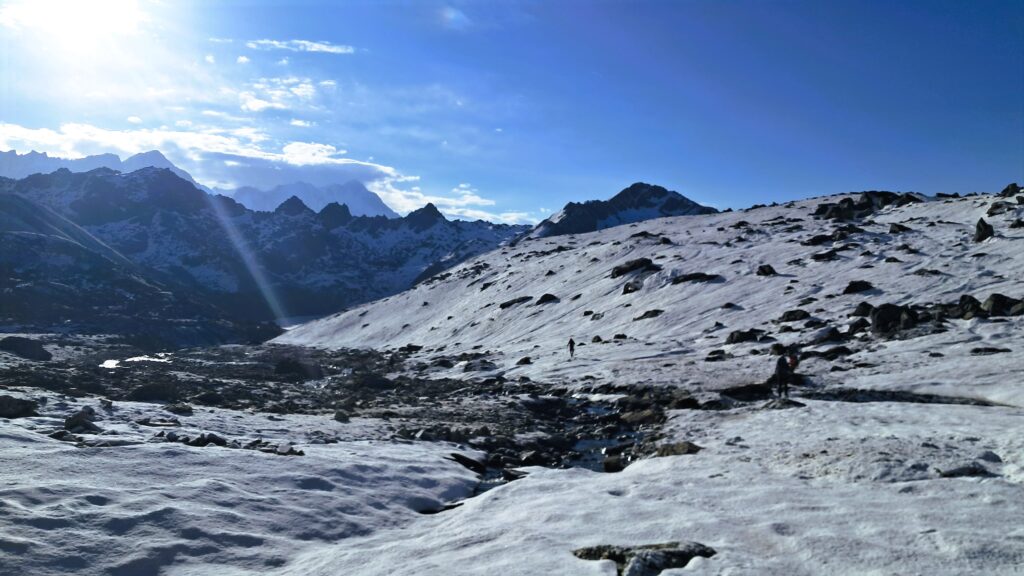
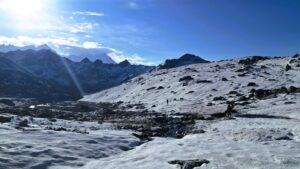
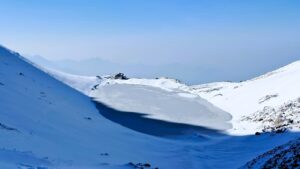
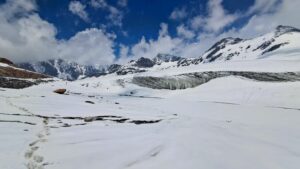
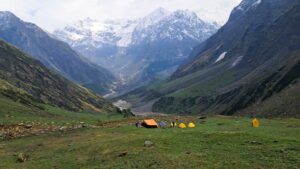
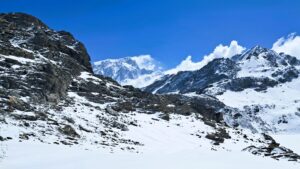
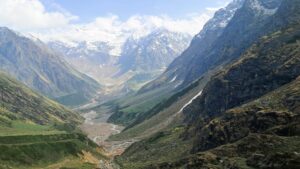
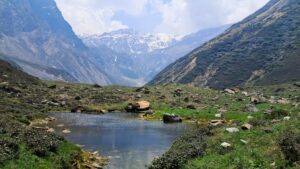




There are no reviews yet.